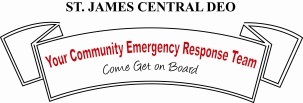IN THE CASE OF AN EARTHQUAKE
No one can predict with any certainty when an earthquake will occur. It is therefore very important for all citizens to get prepared in advance, by finding out about protective measures to be observed before, during and after an earthquake, and include these precautionary measures within your overall emergency plan.
The damage resulting from an earthquake varies depending on its intensity and since Barbados has no history or experience of or from previous incidents, November 2007 was an eye opener.
Let’s look at what your possible home preparedness checklist may look like.
- Discuss with all members of your family how they can turn off your essential supplies; water, gas, electricity.
- Clearly mark the on/off positions for those essential services, attach or store in close proximity to those devices the appropriate wrench or tool that is used to turn on/off that service.
- Ensure that your water heater and storage tank is securely affixed to the building so as to minimise the effects of hot water spillage. Secure top heavy furniture and shelving units so as to prevent tipping. It is a good practice to keep heavy items on the lowest shelf.
- Mirrors, painting and other hanging objects should be removed from the hanging hooks and stored away.
- Ensure that safety latches are affixed to cupboards so as to prevent contents from spilling out.
- Shift beds, chairs and furniture away from windows, close all curtains and blinds so as to minimise shattering glass from inflicting wounds and cuts.
- Televisions and such appliances should be place on the ground, unplugged and secured.
- Ensure that household chemicals are safely stored so as to prevent spillage.
- You may also want to consult with a qualified or knowledgeable builder for additional ways you can protect you home and its contents and other structural investigation techniques.
- Consult your insurance broker and see how your policy can include coverage that can enhance your financial ability to recover loses after the earthquake.
- When an earthquake starts:- If you are indoors stay inside and – Drop; seek cover under a sturdy desk, table or furniture.
- Cover your head and body to help prevent being injured from falling objects. Hold on to that sturdy object, so as to remain covered.
STAY PUT UNTIL THE SHAKING STOPS
- If you are in a vehicle pull over to a safe place away from bridges, buildings, power lines or any thing that could collapse.
- Stop the car and stay inside, and listen to your radio for advisories from emergency officials.
- If a power line has fallen on your car, stay inside until you are rescued. Place your help sign in your window or windscreen.
- If you are in a bus, the driver should pull over to a safe place. Persons should sit in a crouched position and protect your head and body from falling debris.
- If you are at school get under the desk, table and hold on. Do not face the window. Stay calm and await instructions from your teachers.
DURING AN EARTHQUAKE
- Stay away from doorways and windows. Doors can slam shut or you can be injured by shattering glass.
- If you are in an elevator hit the buttons for every floor and get out as soon as you can. Stay away from the coastline as earthquakes can trigger large ocean waves.
AFTER AN EARTHQUAKE
- Listen to the radio as the emergency officials will give pertinent information and instructions.
- Prepare for aftershocks. Check your home for structural damage or other hazards.
- Place a help sign in your window if you need assistance.
- Check on your neighbour after looking after members of your own household, to see if persons are trapped. If persons are injured and you are not knowledgeable as to what procedures to be followed seek assistance.
- Do not turn on switches, cell phones or open flame unless you have certified that no gas leaks exist or no flammable liquid has spilled. Use a flashlight to check utilities.
- If water is still available immediately after the earthquake fill receptacles and other containers in case the supply is shut off later.
- If you have to leave your home, take your emergency kit. Post a message in clear view indicating where you are going. Wear protective shoes to prevent injury.
- Do not waste food or water. Supplies may be interrupted for a while.
- When you are preparing an emergency plan for your household, plan early and discuss the plan with all members of the family. Start by identifying what can happen to your home and how the various hazards may impact on your home. Flood, fire earthquakes, storm surge, hurricane based on its location and your physical environment. Know all evacuation routes for hazards make sure to write your plan so everyone in the household has a copy.
- Make a list of what needs to be done and try to complete them.
- Store important documents and identify another family or friend who you contact regularly to discuss your plan.
- Make sure you acquire supplies and food and stock an emergency kit for each person in your household. Assign responsibility of tasks to each family member. Ensure you have adequate medication.
- Do prepare a plan for any pets or livestock you have.
Always wear bright colours during an emergency.
